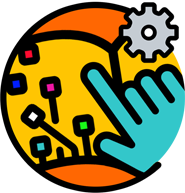 iTEL
iTEL
Search results: 6046
![KE37603 SISTEM KOMUNIKASI [2-2023/2024]](https://itel.ums.edu.my/pluginfile.php/712464/course/overviewfiles/Communication%20Cover.jpg)
KE37603 SISTEM KOMUNIKASI [2-2023/2024]
This course focuses on analysing and designing communication systems, including analogue and digital systems. We will cover modulation and demodulation techniques, the performance of modulation in noise, and the application of these techniques to current systems, including radio, TV, satellite, and cellular systems. The analogue communication systems will be studied first. Then the basic theories for communication systems are briefly covered, such as random process, estimation and detection, information theory, and error correct coding. With these theories, current digital communication techniques will be investigated.
![KE38203 REKA BENTUK ELEKTRIK DAN ELEKTRONIK [2-2023/2024]](https://itel.ums.edu.my/pluginfile.php/712467/course/overviewfiles/EE%20Design%20Cover.jpg)
KE38203 REKA BENTUK ELEKTRIK DAN ELEKTRONIK [2-2023/2024]
The course on Electrical and Electronic Design offers students a comprehensive exploration of the principles, methodologies, and practical applications of designing engineering systems in the realm of electrical and electronic domains. Throughout the course, students will embark on a journey from theoretical understanding to hands-on implementation, gaining invaluable insights and skills essential for modern engineering practices. The emphasis of the course is towards the practical aspects of design implementation. Furthermore, the course equips students with the necessary skills to translate theoretical concepts into tangible hardware solutions. Students will gain practical experience in hardware implementation, learning to select components, design circuits, and assemble prototypes effectively. Through laboratory sessions and project-based assignments, students will apply theoretical knowledge to practical scenarios, fostering creativity and innovation in the design process.
![KE37503 ANALISA SISTEM KUASA [1-2023/2024]](https://itel.ums.edu.my/pluginfile.php/407756/course/overviewfiles/power.jpg)

